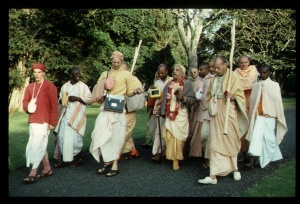SB 8.1.19

A.C. Bhaktivedanta Swami Prabhupada
TEXT 19
svārociṣo dvitīyas tu
manur agneḥ suto 'bhavat
dyumat-suṣeṇa-rociṣmat
pramukhās tasya cātmajāḥ
SYNONYMS
svārociṣaḥ—Svārociṣa; dvitīyaḥ—the second; tu—indeed; manuḥ—Manu; agneḥ—of Agni; sutaḥ—the son; abhavat—became; dyumat—Dyumat; suṣeṇa—Suṣeṇa; rociṣmat—Rociṣmat; pramukhāḥ—beginning with them; tasya—of him (Svārociṣa); ca—also; ātma-jāḥ—sons.
TRANSLATION
The son of Agni named Svārociṣa became the second Manu. His several sons were headed by Dyumat, Suṣeṇa and Rociṣmat.
PURPORT
manvantaraṁ manur devā manu-putrāḥ sureśvaraḥ ṛṣayo 'ṁśāvatāraś ca hareḥ ṣaḍ vidham ucyate There are many incarnations of the Supreme Personality of Godhead. Manu, the manu-putrāḥ (the sons of Manu), the king of the heavenly planets, and the seven great sages are all partial incarnations of the Supreme Lord. Manu himself, his sons Priyavrata and Uttānapāda, the demigods created by Dakṣa, and the ṛṣis like Marīci were all partial incarnations of the Lord during the reign of Svāyambhuva Manu. During that time, the incarnation of the Lord as Yajña took charge of ruling the heavenly planets. The next Manu was Svārociṣa. The Manus and the sages and demigods are further described in the following eleven verses.